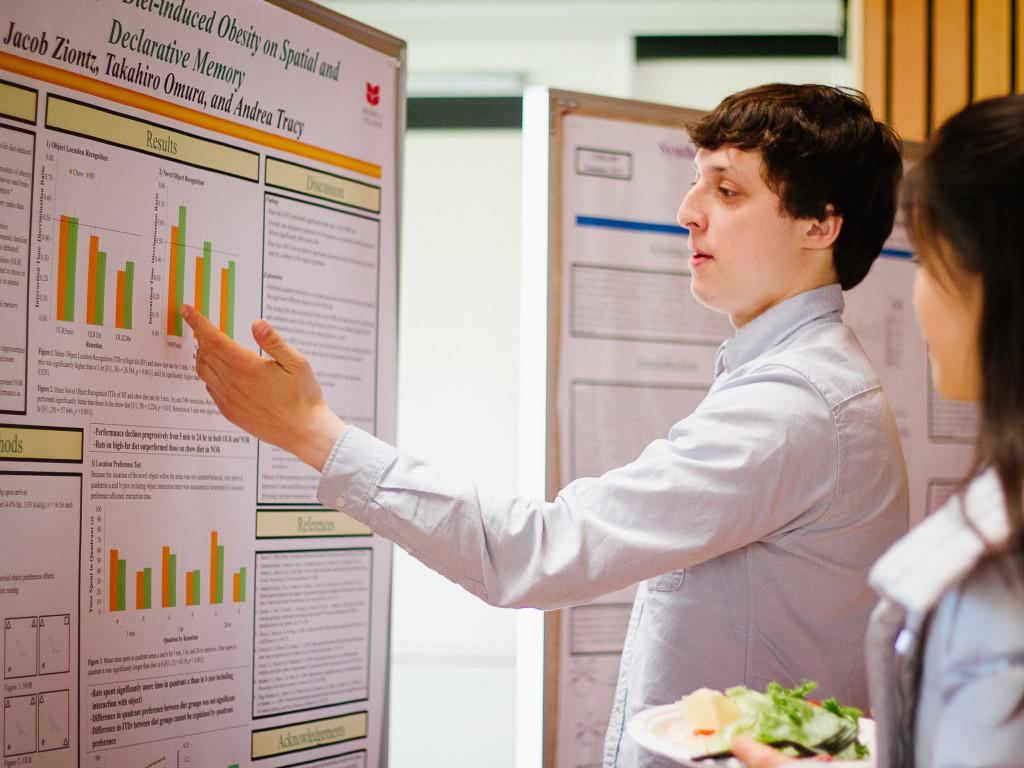Thanh Mai
maithanh@grinnell.edu
The Office of the Dean hosted the Student Research Symposium from April 11-14, featuring student research on space, time and the cultural and systematic destruction in “The Hunger Games.”
Students applied to present at the symposium by submitting abstracts on preliminary or completed results from their original research. Then, in preparation for the symposium, students whose abstracts were accepted were expected to prepare a 15-minute presentation.
The day of the symposium, each presentation was organized into specific categories, which would be presented in the JRC. Many of the students whose presentations were accepted presented research from their classes, research collaboration with their professors or summer Mentored Advanced Projects (MAPs).
Policy Seminar student Glorianne Dorce ’17 started working on her project along with her peers as a required class project. Students taking the seminar taught by Professor Stephen Sieck, Chemistry, and Professor Bradley Graham, Economics, were required to submit work for the symposium.
Dorce was drawn to her research topic, refugee-funding policies in Cuba in 2016, because of the interdisciplinary policy research she did in her class as well as her background as the daughter of immigrant parents.
Dorce examined policies passed by Congress and statistics from the Library of Congress and the Department of Homeland Security to fully analyze the subject of her research. She felt prepared for the symposium because of the weekly group preparation and one-on-one faculty meetings she received from her class.
“As a student, even professors have as much questions students do,” Dorce said. “And while they are experts in their field, they aren’t experts in everything and are also interested in what students want to research and say.”
Her statement holds especially true as well for students like math major, Jun Taek Lee ’17, who strongly admired the professor who helped him with his research. Lee’s presentation was based on his collaborative research on multi-fractal systems with Professor Damian Kelty-Stephen, Psychology.

Photo by Hung Vuong
Multi-fractal systems involve the mathematical study of a continued spectrum of exponents in a fractal system. Lee stated it was Stephen’s intellectual curiosity as a professor that often led him to work on interdisciplinary research topics outside of psychology such as multi-fractal systems.
Lee himself was interested in the study of multi-fractal systems after being presented with the question “How would you measure a coastline in Britain?” After learning of the infinite possibilities of measurement and the complexities in multi-fractal theory, Lee was drawn to doing research in the fall with Stephen and decided to improve his presentation skills by applying to present at the research symposium.
“This symposium was especially beneficial to me because it improved my communication skills because I gained practice catering to a general audience and talking about my work conceptually,” Lee said.
Another student presenter, Ryan Davis ’16, also strongly agrees with Lee and understands the difficulty in conveying information professionally and concisely. He prepared for the symposium by synthesizing his poster on information from a research paper about “Altered Foraging Behavior of The Black Spiny Tailed Iguana in the Presence of a Predator Call.”
“[It was] an excellent way for me to utilize all the skills I’ve gained as a science major and put them to the test,” Davis said.



















































